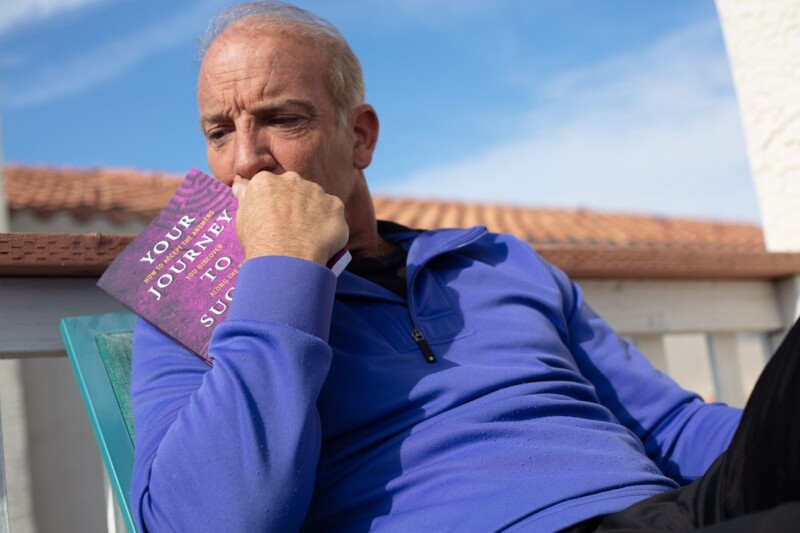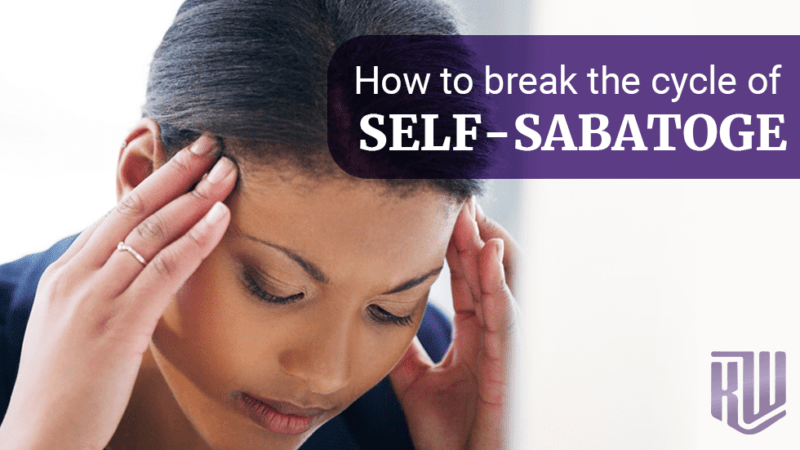Welcome back! Today we’re talking about self-sabotage: what creates it and how to get out of the cycle.
The first place we need to start is: what creates it? What makes the need and desire to self-sabotage is: we were told directly or indirectly that we had no worth as a child. what creates it and how to get out of the cycle.
Think about it: underneath the self-sabotage is the belief that we don’t have the value to achieve it. In those self-sabotaging moments.
we have a feeling that tells us we don’t want to take a particular action even though we know it will help us achieve our dreams.
That sense of dread or procrastination was placed into us and stopped us from doing what we want. That feeling of anxiety or procrastination is a shame.
It is the feeling that we will be bad if we claim what we want.
Where does this come from?
How does this happen? Over 80% of the people I talk to say their parents and childhood were great and perfect. I can appreciate that – personally.
I believe every parent wants nothing but the best for their kids, even in imperfect parenting moments.
But the fact of the matter is: our parents make mistakes. And a lot of them. I’m going to prove that to you.
Here’s the first step to get out of denial about our childhood. Science shows 70% of the messaging we get as a child is negative, disempowering, and self-sabotaging.
Think about that. Over 2/3 of what we heard from our parents was negative.
Even a simple divorce causes actual brain damage and the feeling of abandonment. If we believe there were no imperfections in childhood, that means we think we were raised by a perfect human being – a God.
That’s not possible! Finally, to get into the reality of childhood,
I’ll ask you two questions to prove you suffered trauma or less-than-perfect parenting that still affects you:
1- When you were a child and felt sad, lonely, or scared at anything your parents did or said, did you discuss it with them and voice it?
No way. They probably yelled at you to get into your room and to not backtalk.
2- Do you have any secrets from your parents? We all do. Do you see how traumatizing that is? It means that if I were to share who I really was, if they knew what I really thought, felt, or did.
I believe they will reject me. Ultimately we don’t feel safe with our parents. That’s horrifically traumatizing! They are the two people we should feel the safest and secure with, yet we believe our truth is not allowed.
This trauma creates what I call The Worst Day Cycle. There are four stages to it: trauma, fear, shame, and denial.
Everyone is caught in this dynamic. Every choice in your life revolves around this cycle, and I’m going to walk you through it – it’s at the heart of self-sabotage.
The cycle is created because we have two needs as a species: attachment (physical or emotional to someone else) and authenticity (the pursuit of who we naturally are).
The previous questions show that our power was squashed if we were to speak our truth or pursue who we are.
We weren’t allowed to follow our authentic selves.
Because we don’t want to lose attachment – our survival depends on it as a child.
In the pursuit of attachment, we lose our authenticity.
We all downplay, deny, and justify what happened to us. We do it to stay alive.
It’s the moment shame and denial are born.
In those less-than-perfect moments, a big chemical explosion in our brain and body is created: fear. That chemical release becomes a chemical addiction.
It takes a lot of energy for our brain to do anything: 25% of the calories we consume go straight to our brain. In addition, the brain doesn’t process right or wrong but rather known and unknown.
If we’ve lived and experienced it, our brain will repeat it even if it’s wrong. The traumatic feelings got known in childhood, and the brain chooses to relive them in its effort to conserve energy.
It’s an emotional chemical addiction that keeps us stuck. The fear we get addicted to is always one of three things: the fear of rejection, inadequacy, or powerlessness.
Think of that moment when you went to express yourself as a child. Rejection. Inadequate. Powerlessness. It’s an overwhelming cocktail of horrifically painful emotions that get stuck in our bodies.
The overwhelming nature of these feelings sends us into shame.
Shame is the feeling that there’s something wrong with us – it’s internal.
“Come on; you’re so stupid!” We learned we must be bad, wrong, stupid, or defective in some manner, either directly or indirectly, through our parent’s actions or expressions.
This is why we self-sabotage. As a child, we were powerless, and we couldn’t argue with our parents. Now we’re adults. We get to pick where to live, where to work, who to marry. What’s the greatest way to get our power back?
To choose things that don’t work because we get so much attention (attachment) from others. Because our brain and body were trained to repeat the miserable feeling of not liking ourselves – stuck on the emotional, chemical loop.
We pick terrible relationships or careers to relive that pain against ourselves. It is a subconscious attempt to get our power back because I chose.
Until we heal the original wound, this is precisely what we do: your life story is proof of it.
Do you see how the terrible person you’re with or your bad job reminds you of the same chaos, confusion, uncertainty, and belittling dynamic in childhood?
If you’re in denial, you won’t see it, and I urge you to seek professional help. We need help to see the tie-ins if we want to stop the cycle.
The shame piece is our attempt to remedy how we were told, directly or indirectly, that we didn’t have worth.
Who we were meant to be was squashed, so as a child, we develop a false persona to create attachment and survive.
I tried out for two professional sports before deciding that neither of them was for me.
I was only trying to gain my father’s attention and get back at my brother by repeating the agony. My brother was shooting at my head when I stopped the frozen tennis balls as a kid, therefore I became a hockey goalkeeper.
it would make him mad. To get my power back as an adult, I relived the abuse against myself. I continued the cycle as the person in control.
You’ll see this in every aspect of your life.
Ask people about their careers, and you will hear how they are reliving the unhealed pain of their childhood.
People in finance will tell you stories of money problems. Salespeople never felt a sense of worth, insurance people, no safety. The correlations are so transparent.
All we do is relive it until we heal it. Gallup has done polls for years that show only 7% of people are happy in their careers. Now you know why.
They are all reliving the pain and trauma from childhood against themselves; they are stuck in The Worst Day Cycle.
This self-victimization kicks us into denial: this process shows us we have to admit we don’t know who we are. We have careers and hobbies but don’t honestly know what we like.
Many of you will say there’s no way you’re starting over – that you can’t admit it to yourself. You may say I’m wrong.
But science disagrees with you: 95% of our adult life, thoughts, feelings, and choices are all derived from the emotions placed into our subconscious as a child.
Remember: our brain seeks to repeat what it knows. You may disagree with my premise, but your life story shows you the proof. You can’t outrun yourself.
I know it’s hard to hear.
It all comes down to imperfect parenting, but parents are not to blame – for centuries, we’ve never been taught these topics and their effects.
Our parents don’t know any better. How can we blame – where does it end? Back to the first cell or Adam and Eve?
Waste of time. Everyone is perfectly imperfect, and no parent can be blamed for doing something they weren’t even aware of. Many parenting skills we thought were good at the time were only later seen as abusive.
We didn’t know. We always do the best we can with what we know at the time.
It’s daunting enough to admit we are reliving a subconscious program, but there’s more.
Can you see the second reason we self-sabotage and relive the cycle:
if we accept the truth and pursue our authentic self, we give up attachment to our parents. If we heal, admit our secrets, become what we want, and succeed, we lose attachment.
Remember, we became all of those things so our parents wouldn’t leave us. This may not make sense at first but think: what happens in a riot? People are mad at the police and government but destroy their own neighborhood and themselves.
This is proof of the worst-day cycle. How do we celebrate as a culture? We get drunk, stoned, over-eat, victimize, destroy, and self-sabotage.
Then, we repeat the self-sabotage and go into denial, saying these things aren’t true,
I’m not forgiving myself for the suffering I’ve caused myself in the past?
I didn’t make up a phoney identity to get attention; I’m comfortable with myself.
Are you sure? What happened the last time you got drunk? You woke up hungover the next day, tell your kids you can’t play, boom.
the kids feel rejected, and now the cycle has passed onto them. They can’t comprehend hangovers, only that mom or dad abandoned them.
Do you remember how they tried to modify their behavior to get your attention/attachment and love? Can you now see how you did the same thing in your childhood?
We’re all perfectly imperfect
we can’t stop the cycle. But we can take ownership of our actions and choices and do the work to conquer the cycle. As a society, we need to talk about it openly with ourselves, friends, and family.
We need to make it OK to end the cycle. If you’re honest with yourself, you’ll see we do all of this – everyone. I know it’s scary, but this is how we get our self-esteem back.
If we can’t admit the truth, we have low self-esteem – we need to confront the pain, darkness, and pain.
It hurts, but you will be in reality and gain self-esteem. It’s the recovery process.
It’s how you get your authentic self back. You did the best you could with the information you had at the time. Now that you have new and better information, you can do something about it.
This may be the first day in your life you actually have a choice to pursue your greatness: therefore, you are not to blame for any of your imperfections.
You can’t be blamed for doing something you weren’t even aware of. But now you have a choice
will you relive that pain against yourself or make a change to learn about this, do the work, recover, and end the cycle?
If you want to make that choice, the process is pretty simple: become an expert in the worst day cycle. To do that, pick up my book.
I lay out the exact process much more profound than I just did. Next, gain Emotional Authenticity. My book will help give you the tools to achieve Emotional Authenticity.
Step three is to get out of denial and admit your trauma. Step four, become an expert in your fear, shame, and denial.
Every person who’s done this process has reclaimed their authentic self: it has never failed. When there’s no denial, there’s truth, self-esteem, self-love, and authenticity. Or, as I like to call it, Our Greatness.
Enjoy The Journey! ??





